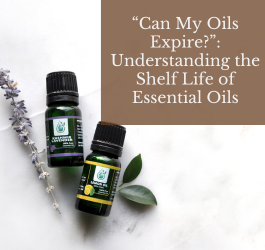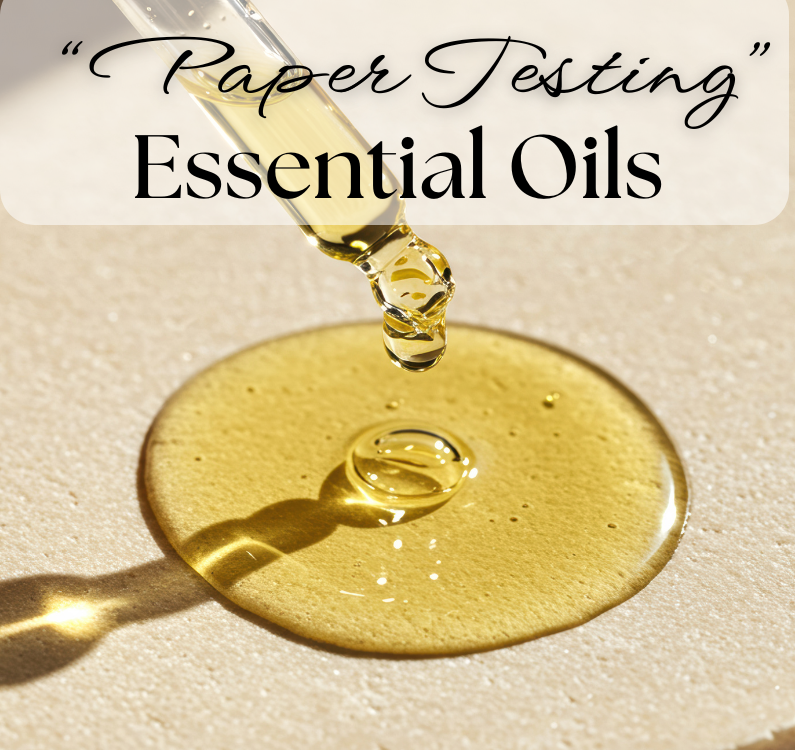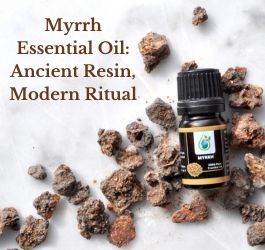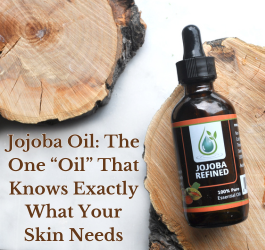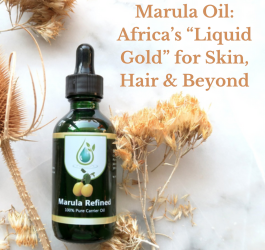Essential oils have been treasured for centuries, valued for their therapeutic properties, aromatic qualities, and versatility in daily life. However, as with any natural product, they don’t last forever. Understanding the shelf life of essential oils is essential for ensuring safety, maximizing their benefits, and avoiding waste.
At Jade Bloom, we’re committed to not only providing high-quality essential oils but also educating users to make informed decisions. Misunderstandings about shelf life are common in the industry, and we aim to dispel myths and provide clear, actionable guidance on how to care for and use your oils effectively.
What Influences the Shelf Life of Essential Oils?
Several factors affect how long an essential oil retains its quality and effectiveness:
-
Chemical Composition: The stability of an essential oil depends largely on its chemical makeup. Oils high in monoterpenes, such as citrus oils, tend to degrade faster, while those rich in sesquiterpenes, like sandalwood or patchouli, are more stable.
-
Storage Conditions: Light, heat, and air exposure can cause oils to oxidize, leading to changes in aroma, consistency, and efficacy. Storing oils in a cool, dark place in tightly sealed, dark glass bottles can help slow this process.
-
Oxidation: When exposed to air, essential oils begin to oxidize, altering their chemical structure. This not only diminishes their therapeutic properties but can also increase the risk of skin irritation when applied.
Shelf Life of Commonly Purchased Essential Oils
While essential oils don’t “expire” in the traditional sense, they do degrade over time. Here’s a general guide for the shelf life of some of the most common oils:
-
Shorter Shelf Life (1-2 Years): Citrus oils, such as Lemon, Orange, and Grapefruit, some conifers, and oils high in monoterpenes oxidize quickly.
-
Moderate Shelf Life (3-5 Years): Most woody, resinous, or spicy oils. Oils like Tea Tree, Lavender, Eucalyptus, and Peppermint have more stable compositions, allowing them to last longer.
-
Longer Shelf Life (6-10+ Years): Resinous, thick, or base note oils. Oils with sesquiterpenes, like Sandalwood, Patchouli, and Vetiver, are known for their longevity when stored properly.
Scroll to the very end of the blog post for a full list of essential oil shelf lives! If you’ve purchased oils from Jade Bloom, you can contact Jade Bloom and provide the batch number on your bottle to track the oil’s age and ensure it’s still suitable for use.
Recognizing When an Essential Oil Has Expired
Expired essential oils don’t always look or smell the same. Here are some signs to watch for:
-
Changes in aroma (e.g., a sour or unpleasant smell).
-
Thickening or cloudiness in consistency.
-
Darkening or discoloration of the oil.
Using oxidized oils can lead to reduced effectiveness, unpleasant odors in diffusers, and even skin irritation. Additionally, oils stored improperly can affect containers, leaving residue or odors that are difficult to remove.
Myth Buster: There’s no way to “reactivate” or restore an expired oil. If an oil is past its prime, it’s best to repurpose it or dispose of it responsibly.
Tips to Extend the Shelf Life of Essential Oils
-
Store oils in dark, glass bottles with tightly fitting caps to minimize air exposure.
-
Keep oils in cool, dry places away from direct sunlight.
-
Refrigerate oils with shorter shelf lives, such as citrus oils, to slow oxidation.
-
Purchase smaller quantities if you’re an occasional user to ensure oils are used before they degrade.
-
Use Jade Bloom’s travel cases to keep your oils safe and protected while on the go.
DIY Uses for Oxidized Essential Oils
Even if an essential oil is no longer suitable for topical use, it can still be put to good use in other ways:
-
Add a few drops to homemade cleaning products, such as all-purpose sprays or floor cleaners.
-
Refresh potpourri or car air fresheners for a pleasant scent boost.
-
Use in candle-making projects for a subtle fragrance.
-
Repel pests by diluting oxidized oils like peppermint or eucalyptus and applying them in gardens or closets.
Safety Tip: Avoid using oxidized oils on the skin or in diffusers, as their chemical changes can pose risks.
Additional Resources and Studies
For a deeper understanding of essential oil shelf life, these resources offer expert insights:
-
Oxidation and the Shelf Life of Essential Oils – Tisserand Institute
-
Essential Oil Shelf Life – AromaWeb
-
Do Essential Oils Expire? – Healthline
-
How to Avoid the Dangers of Expired Oils – ACHS
-
Antioxidant Activities of Essential Oils – NCBI
By understanding the factors that influence shelf life and taking simple precautions, you can extend the usability of your essential oils while keeping your collection safe and effective. At Jade Bloom, we believe in empowering our customers with accurate information and high-quality products to make the most of their essential oil journey.
If you found this blog post helpful, feel free to share it with others who might benefit from this information. Together, we can create a more informed and responsible essential oil community.
Specific Essential Oils and Their General Shelf Life
Shorter Shelf Life (1-2 Years)
- Balsam Fir
- Bitter Orange
- Blood Orange
- Douglas Fir
- Eucalyptus (Globulus, Radiata)
- Green Mandarin
- Lemon
- Lemon Eucalyptus
- Lemongrass (Cold Pressed)
- Lime
- Mandarin
- Norway Spruce
- Pink Grapefruit
- Sweet Orange
- Tangerine
- Tea Tree
- White Spruce
- Wintergreen
Medium Shelf Life (3-5 Years)
- Ajowan (3-4 years)
- Allspice (3-4 years)
- Anise (3-4 years)
- Star Anise Seed (3-4 years)
- Balsam Peru
- Sweet Basil (3-4 years)
- Bergamot (Bergapten-Free) (3-4 years)
- Black Pepper
- Black Spruce (3-4 years)
- Cajeput (3-4 years)
- Calamus (3-4 years)
- Camphor
- Cananga
- Caraway (3-4 years)
- Cardamom
- Carrot Seed
- Cassia
- Cedar Leaf
- Cedarwood Atlas
- Cedarwood Texas
- Chili Seed
- Ceylong Cinnamon (Bark, Leaf)
- Citronella
- Clary Sage
- Clove Bud
- Clove Leaf
- Cocoa
- Coffee
- Cognac (White) (3-4 years)
- Copaiba Balsam
- Coriander Seed
- Cumin
- Cypress
- Dill Seed (3-4 years)
- Sweet Fennel (3-4 years)
- Fenugreek
- Siberian Fir Needle (3-4 years)
- Frankincense (Serrata, Carterii, Sacra)
- Galbanum
- Garlic (3-4 years)
- Geranium
- Ginger
- Ginger Grass (3-4 years)
- Himalayan Cedarwood
- Ho Wood
- Holy Basil (3-4 years)
- Helichrysum
- Juniper Berry (3-4 years)
- Laurel Leaf (3-4 years)
- Lavender (Bulgarian, Cashmere)
- Manuka
- Marjoram
- Myrtle
- Nutmeg (3-4 years)
- Onion (3-4 years)
- Oregano
- Palmarosa
- Parsley Seed (3-4 years)
- Pine Needle (3-4 years)
- Ravintsara (3-4 years)
- Rosemary
- Sage
- Savory
- Silver Fir (3-4 years)
- Spanish Hyssop
- Spearmint (3-4 years)
- Tarragon
- Templin Fir Cone (3-4 years)
- White Thyme
Longest Shelf Life (5+ Years)
- Amyris (Western Indian Sandalwood) (6-8 years)
- Palo Santo (5-7 years)
- Patchouli (5-10 years; improves with age)
- Petigrain (5-7 years)
- Pimento Leaf (5+ years)
- Tobacco Absolute (5+ years)
- Tumar Seed (5+ years)
- Turmeric (5+ years)
- Vanilla Oleoresin (5+ years)
- Verbana (5+ years)
- Vetiver (5-10 years; improves with age)
- Siam Wood (5+ years)
- Ylang Ylang (5+ years)
Special Considerations
- Resins and Thick Oils
- e.g. Myrrh, Copaiba Balsam, Frankincense
- Can sometimes last even longer if stored properly
- Citrus Oils
- Tend to oxidize the fastest due to high monoterpene content. Keep them refrigerated if possible.
- Patchouli and Vetiver
- Actually improve with age, much like fine wine.
- Vanilla Oleoresin
- Is more stable than many oils but can thicken over time.


